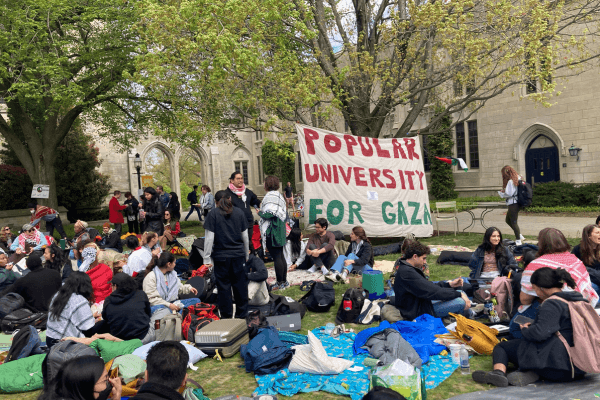What do evangelicals in the U.S. want? Immigration reform.
When do they want it? Now.
When will they get it? No time soon, it seems.
According to a recent Lifeway Research poll sponsored by the Evangelical Immigration Table and other evangelical groups, evangelicals desire immigration reform with increasing urgency. Showing a marked increase from prior years, 77 percent of poll respondents say it is important that Congress passes significant new immigration legislation in 2024 — up from 71 percent in 2022 and 68 percent in 2015.
Their opinions are in line with the wider U.S. population, which generally agrees that the current immigration system needs to be reformed. Different political groups, however, rarely agree on what exactly is broken or how to fix it.
Among evangelical leaders, the consensus is that the legislation should be both bipartisan and comprehensive. That is the golden standard, said Chelsea Sobolik, director of government relations at World Relief — the humanitarian arm of the National Association of Evangelicals, and one of the poll’s sponsors.
Research from political scientists Ruth Melkonian-Hoover and Lyman A. Kellstedt confirms that evangelical clergy and denominational leadership tend to support immigration reform efforts, and have stepped up their involvement to support them, based on biblical principles of “welcoming the stranger.” But a combination of partisanship, presidential voting preferences, and right-wing cultural populist attitudes mean not all evangelicals feel the same, they write. In particular, white evangelical laity historically view the effects of immigration most negatively and favor the most restrictive immigration policies.
From her time working in the nation’s capital, Sobolik knows immigration issues can draw strong passions from different populations and political factions. Nonetheless, she believes in the power of faith to motivate lawmakers to find bipartisan solutions by meeting on common sacred ground.
“Americans of faith want leaders who will work together on immigration and sensible border solutions,” Sobolik said in an interview. “They want pragmatic reforms that offer increased security infrastructure without sacrificing compassion and human dignity.
“In the end, they want a different, more reasonable conversation,” she said.
Sobolik suggested those sensible solutions draw on the principles proposed by the Evangelical Immigration Table, which include: respect for the God-given dignity of every person; protecting the unity of the immediate family; respecting the rule of law; guaranteeing secure national borders; ensuring fairness to taxpayers; and establishing a path toward legal status and/or citizenship for those who qualify and who wish to become permanent residents.
The political landscape
But even with broad evangelical support, a bipartisan breakthrough on immigration policy seems unlikely, at least any time soon. The last major immigration reform — the Immigration Reform and Control Act — passed in 1986.
A decade-and-a-half later, in 2001, Congress began debating the concept of comprehensive immigration reform (CIR), which combines increased border enforcement with expanded pathways for asylum seekers and authorized immigrationl. Reconsidering nearly all aspects of the U.S. immigration system, CIR bills were debated in the U.S. Senate in 2006, 2007, and 2013. Each of them failed, derailed by pockets of congressional pressure on both sides.
More recent efforts like the Dignity Act (H.R. 3599), proposed by a bipartisan group of representatives led by Reps. María Elvira Salazar (R-Fla.) and Veronica Escobar (D-Texas), are still in process.
A news release from Salazar’s office says the bill is “based on the biblical principles of Dignity and Redemption.” It was written in consultation with a range of business leaders, agriculture and farming industries, the faith-based community, immigration reform groups, and border security experts. Among its supporters are prominent faith organizations such as Catholic Charities USA, the Ethics & Religious Liberty Commission of the Southern Baptist Convention, the National Association of Evangelicals, the National Latino Evangelical Coalition, U.S. Conference of Catholic Bishops (USCCB), and World Relief.
Introduced in May 2023, the bill is stuck with the Subcommittee on Border Security and Enforcement, the first stage of the legislative process. It must first make it out of that subcommittee before it can be sent to the House or Senate for a vote.
Then, in early February 2024, a bipartisan group of senators proposed new immigration legislation linked with aid packages for Israel and Ukraine that would have, experts say, made it harder for migrants to both apply for and receive asylum. The bill was declared “dead on arrival” by Republican Speaker of the House Mike Johnson. Meanwhile, some Democrats opined that the draft proposed nothing to provide a pathway to citizenship for millions of undocumented people already living in the U.S. — including immigrants brought to the U.S. as children, or “Dreamers.”
This proposal, like so many before it, failed.
Sobolik said she believes the senators who negotiated the bill — James Lankford (R-Okla.), Kyrsten Sinema (I-Ariz.) and Chris Murphy (D-Conn.) — acted in good faith. On the one hand, she said, that gives her hope that policymakers can find the bipartisan solutions that evangelicals — and Americans in general — want.
On the other hand, the bill died within 72 hours and it’s an election year.
“Whether we like it or not, people are going to be divisive and use the border and immigrants as an issue to run on rather than an issue to bring common sense solutions to,” she said. “That factors into why there hasn’t been any movement for years.”
A shift toward practical hope
In lieu of fresh legislation, border security priorities and legal pathways for migrants have shifted constantly from one U.S. administration to the next, for nearly 40 years.
The end result is often confusion, frustration, and uncertainty for migrants, say faith-leaders working along the U.S.’s southern border.
It almost makes one cynical, said Jon Huckins, pastor and co-founding director of The Global Immersion Project, working in the context of the U.S./Mexico from his home city of San Diego.
Huckins said many in his community, including longtime residents and newly arrived migrants, don’t believe nuanced solutions on immigration are anywhere on the horizon.
“The last time we had hope was in 2013,” he said, “and we learned our lesson.”
Talking about the “Border Security, Economic Opportunity, and Immigration Modernization Act,” or S.744, proposed by a bipartisan group of eight senators known as the “Gang of Eight,” Huckins said there was a palpable expectation that legislation that would invest in border security and make the system more humane and compassionate was imminent.
While the bill passed the Senate with a strong majority — 68–32 — the House of Representatives, under Speaker John Boehner, did not act on the bill, and it eventually expired.
“That was our last, most realistic opportunity,” Huckins said. “Since then we’ve been stuck watching people on both sides of the border get battered around by stop-gap measures and executive orders.
“It’s enough to make you want to give up,” he said.
Rather than fantasize about some legislation to come, Huckins and those he works with try to deliver practical hope to their neighbors in the form of local support. That means building relationships with both undocumented migrants and border patrol agents; visiting detention centers and advocating for asylum seekers; or helping with the practicalities of translation, housing, child care, medical care, food and nonlegal logistical support.
He encouraged other evangelicals who want to see immigration reform to do the same. “Out in the weeds and mess of the reality of these policies on the ground,” he said, “people might think about them with more nuance — to dream of a collective commitment to mutual flourishing for citizens and those seeking to migrate.
“We have to agree that there will be some form of compromise,” Huckins said. Otherwise, within the echo chambers of our own ideologies, opponents will just continue to misrepresent each other’s positions, create further political polarization, and give voters a false choice that continues to contribute to the legislative stalemate that is costing migrants their lives, he said.
In the meantime, Huckins sighed, “We try to do good, avoid the worst, and wait for the best.”
Got something to say about what you're reading? We value your feedback!







